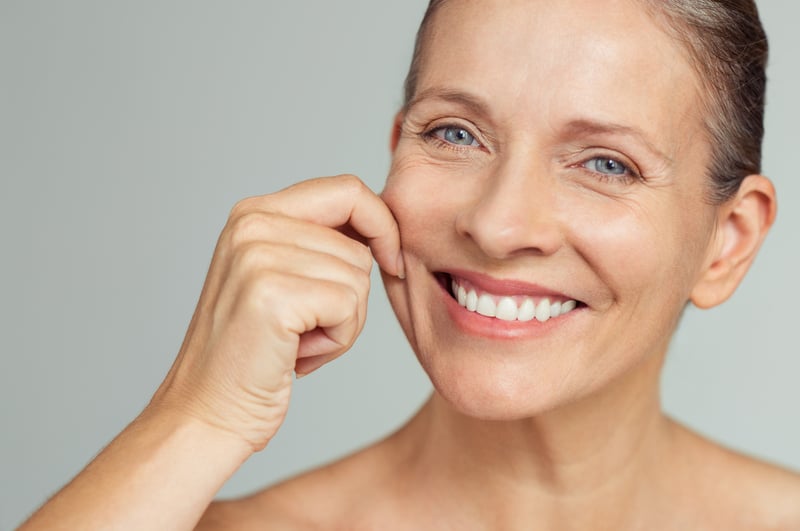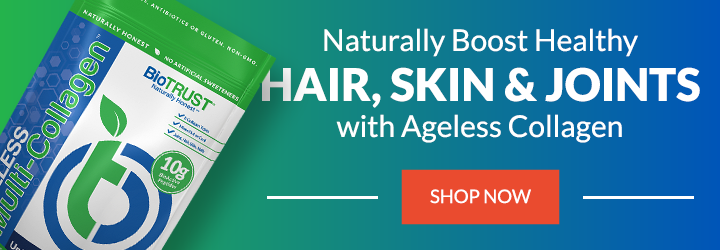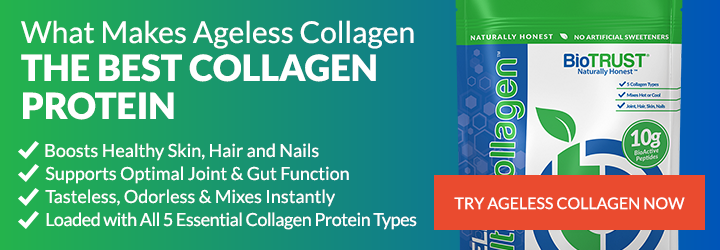How to Improve Skin Elasticity at Any Age

When you touch your skin and it pulls or stretches slightly, do you notice it bounce back quite as quickly as it once did? That’s because, as we age, we lose skin elasticity — the skin’s natural ability to return back to normal. It is, of course, a natural, normal part of aging. Yet, lifestyle choices and behaviors can make it better… or worse. And, many of us want to improve skin elasticity and retain it as long as possible to keep our skin looking younger and healthier.
You see, skin that has lost its elasticity (a process known as elastosis) starts to look wrinkled, leathery, saggy, and just plain older. And without proper care, we can begin to look, let’s say “more mature” than we are.
Fortunately, that proper care can help improve skin elasticity and fight off elastosis, so our skin can continue to look as young as we feel.
What Causes Skin to Lose Elasticity?
As the body’s largest organ, skin is designed to protect against the elements, including sunlight, pollution, infections, and more. It’s a hard job, and over time, skin can start to break down and show some battle scars.
Collagen and elastin are needed by the skin and allow it to move smoothly, stretch, and return to normal. Yet, along with aging, both the environment and lifestyle can decrease levels of these key youthful skin building blocks. Some of the worst offenders include sun exposure, air pollution, lack of nutrients, rapid weight loss, and perhaps the most obvious, smoking.
7 Steps to Improve Skin Elasticity
You don’t need to just let time, the sun, and lifestyle choices take their toll. Even if skincare hasn’t been a priority, you can start to improve skin elasticity today. It will likely never again return to that of your youth, but you can make big improvements. Here’s how:
1. Consume Collagen
Unless you eat nose-to-tail and include fish bones and scales with your evening soup, you probably consume hardly any collagen protein in your diet. It can be found in bone broth, but perhaps the easiest way to consume collagen is by taking a collagen supplement. Collagen peptides have an advantage as they dissolve in both hot and cool liquids, and they’re tasteless and odorless, so they’re easy and convenient to add to your diet.
Collagen makes up 70 to 80% of the skin’s weight. And quality collagen peptides help support healthier, firmer, smoother, younger-looking skin by improving skin moisture, elasticity, and surface structure. The result of ensuring your body has an adequate supply of the critical collagen building blocks is the reduced appearance of wrinkles and other signs of aging.
2. Hydrate Your Skin with Hyaluronic Acid
Hyaluronic acid is found naturally within the skin, especially in the skin’s connective tissues. Its main job is to support hydration and lubrication of the skin. Unfortunately, both UV (ultraviolet) light from the sun and aging can deplete levels.
To help improve skin elasticity, ensuring you support levels of hyaluronic acid is key. Many quality skin serums and creams include this potent skin nutrient to help nourish and moisturize the skin.
3. Stop Sun Damage
We need the sun to survive. It’s required for our bodies to synthesize vitamin D. Plus, it helps regulate our circadian rhythms and improves sleep, supports the immune system, lowers blood pressure, improves mood, and may even promote weight loss.
But there is also such a thing as too much of a good thing. And if we are overexposed to the sun, especially UV rays, it can reduce skin elasticity and cause premature aging, dull-looking skin, and brown spots. Skin serums may help, but it’s also important to avoid further damage by using a quality sunscreen if you will be out in the sun for longer than usual.
4. Consume Plenty of Vegetables and Fruits
Antioxidants, like vitamin C, vitamin E, and carotenoids, help the skin bounce back with greater elasticity. So, ensure your diet consists of plenty of antioxidant-rich vegetables and fruits like:
- Leafy greens
- Broccoli
- Sweet potatoes
- Red and yellow bell peppers
- Tomatoes
- Red grapes
- Berries
- Cabbage
- Cucumbers
- Squash
- Beets
Also, make sure to include plenty of antioxidant-rich herbs and spices, like turmeric, ginger, oregano, paprika, and more.
5. Add Healthy Fats to Your Diet
Omega-3 fatty acids have been found to help reduce damage from UV radiation. They’ve also been shown to help reduce markers of inflammation, and they’re essential for a healthy, balanced immune response. Thus, for greater skin elasticity and overall health, it’s a good idea to ensure you are getting omega-3 fatty acids in your diet. Some good choices include:
- Cold-water fish like salmon, sardines, and herring
- Walnuts
- Chia seeds
- Flaxseeds
- Seaweed
6. Protect Your Skin from Air Pollution
You likely know that pollution is a part of life—especially if you live in a big city. But you may not know how damaging it is to your skin (as well as the rest of your body, and especially your respiratory system). If you have a job and/or home in the city, then you probably can’t run away to a rural area to reduce exposure (and depending on the location, you may just find other types of pollution).
So, what can you do to protect yourself from pollution and help improve skin elasticity while you’re at it? It starts by removing it; in other words, detoxifying your body from it. That is, wash your face and skin with a good, gentle, non-drying cleanser. Then, to help give your skin the nutrients it may need for repair, apply antioxidants like vitamin C, vitamin E, and niacinamide directly to the skin.
How to Improve Skin Elasticity: A Wrap-Up
The skin is an amazing organ, especially considering how much most of us put it through, including too much UV exposure from time at the beach, hiking in the mountains, gardening, or spending outside just having fun. On top of that, there’s pollution from so many sources, especially for those who live in big cities. To make matters worse, there’s habits like smoking or being exposed to second-hand smoke. Oh, and don’t forget about eating on the run and failing to nourish our bodies with a quality diet.
Nobody’s perfect, and your skin has likely taken a beating—even if it hasn’t been intentional. Fortunately, no matter how old — or young — you are, you can give your skin the TLC it needs and deserves. Consume collagen, antioxidant-rich vegetables and fruits, and omega-3 fatty acids. Avoid too much sun (and use a quality sunscreen when required). Don’t smoke and protect your skin from pollution. And don’t forget to exercise, drink plenty of water, manage stress, and get your beauty sleep to help improve skin elasticity and enjoy beautiful, younger, healthier-looking skin!








